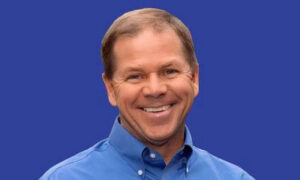5:45
Commentary
Commentary
Are elected officials positive role models for aspiring future public servants? | Opinion
When you look at the behavior of many elected officials, whether at the local, state or national level, how many would you identify as positive role models for young people who are looking to go into politics?
There are characteristics of a positive role model that cut across professions that can be guideposts for young aspirants. They are certainly needed in politics.
Do you think when young people look at what is going on in politics today they are motivated to seek elective office to make things better? Or are they totally turned off by the behavior they see?
Take a brief inventory of past and present office holders — mayors, state legislators, governors, Congressmen, Senators or Presidents — that you voted for or did not vote for.
Who would you point to as a positive role model if a young person in your life said they want to go into politics, to hold a public office?
One would hope that each of us has the capacity to suspend party affiliation and look at the positions, behaviors, and accomplishments of political leaders objectively, and honesty say whether he or she has performed in the best interest of their constituents, the well-being of their city, state and nation.
With all the variant behavior of politicians constantly making the headlines, one must wonder what is considered positive leadership, and good public service.
They are supposed to be abiding by the highest ethical conduct while upholding the laws, institutions, values and traditions that make America. Not caving to financial contributors, lobbyists and those with anti-American agendas.
No one can, or should, just wake up one day and say, “I want to, or I can be mayor, governor, president or hold any elective office.
Meeting the legal requirements to become President of the United States, a U.S. Senator, and U.S. Congressman is the easiest of all. The same is true to become a governor, state legislator, mayor, city alderman/councilman, a county executive or county legislator with minor variations in each locale.
Beyond the legal minimum, those who will work on campaigns, contribute financially and vote to put a person in office should be able to articulate clearly what makes him/her qualified to be there.
What qualities and qualifications would you tell an aspiring public servant they must have if they want to do what is best for the people, your city, your state, the nation?
In today’s political environment, taking inventory of which elected officials are doing a good job and are positive role models is critically needed.
Here are some that should be non-negotiable.
First and foremost, one must have a compelling call to duty, to serve, to protect, to be dedicated and committed to public service. A keeper of the public’s trust.
Holding public office should not be about gaining power, notoriety, selfish interest, and personal wealth.
One must possess uncompromising integrity, high moral standards and ethics, the absence of which should be a non-starter. The public can organize and demand it.
There should be thorough knowledge of the geography, its people and the structure and function of the governmental entity. Knowing the history and effectiveness of previous office holders should be part of the preparation. Representative democracy requires it.
Having a real command of the major issues, challenges and policy decisions should be a prerequisite. Such understanding must be sufficient to distinguish between good advice and bad, to provide leadership and direction.
Good communication, negotiation and consensus-building skills are a must to achieve meaningful outcomes in terms of legislation and allocation of resources.
Effective allocation of limited resources requires being a good steward of taxpayers’ dollars and a visionary, making the best decisions today to get the greatest mileage out of available resources while considering long-term needs.
Inclusiveness and compassion must be high priority. When one considers the complexity and diversity of any aspect of the American landscape, an elected official must have a healthy dose of both traits.
An effective office holder must perform the ultimate balancing act, making decisions to meet the needs of his or her constituency—the rich and the poor, the young and the elderly, the needs of minorities and the majority, the privileged and the disenfranchised, all while adhering to governing laws and regulations.
Given these values and qualification, who would you point to today as exhibiting and practicing the behavior of a good servant of the people, among the politicians that represent you, at the national, state, and local level?
Arguably, the president of the United States is the most visible, most powerful, most influential role model whose behavior is most readily seen.
Some national and international elected officials and leaders have been identified as great role models. You may agree with some on the list. You may have a list of your own.
In today’s political environment, taking inventory of which elected officials are doing a good job and are positive role models is critically needed.
It is worth a serious conversation with aspiring young people who may want to hold elective office but may be turned off by the behavior they are witnessing every day.
Next year, a crop of candidates, from political veterans to campaign novices, will seek your support and your vote in the 2022 elections.
There will be many opportunities to identify those elected officials whose conduct makes them positive role models.
What is on your check list of uncompromising qualities that make a positive role model in politics?
More importantly, which current elected official(s) would you point your aspiring public servant to as role models to emulate, to pattern their conduct and behavior after?
Pass your recommendations on.
Our stories may be republished online or in print under Creative Commons license CC BY-NC-ND 4.0. We ask that you edit only for style or to shorten, provide proper attribution and link to our website. AP and Getty images may not be republished. Please see our republishing guidelines for use of any other photos and graphics.






Janice Ellis